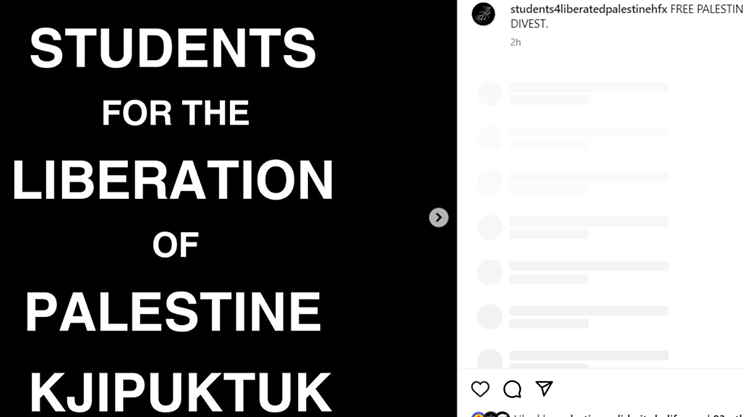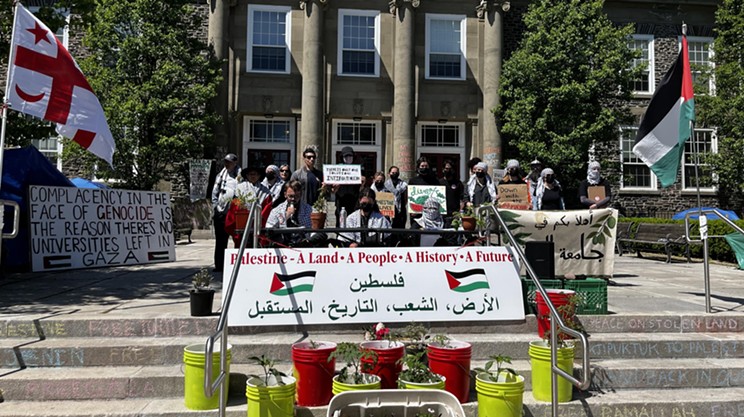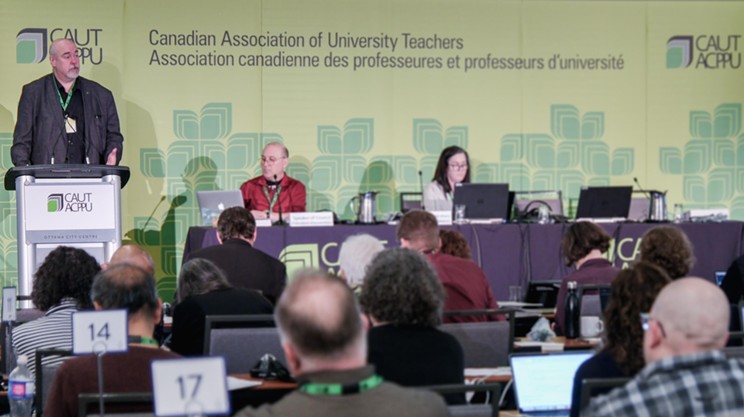On Thursday, July 11, the president of the University of King’s College (King's), William Lahey, put out a statement reiterating the university’s Responsible Investment Policy, and providing updated actions on divestment and disclosure, following months of demands received from students and alumni groups in solidarity with Palestine.
He shared that the current market value of the King’s portfolio, run by TD Asset Management, sits just under $44 million. As of June 24, King's has removed all pooled funds that held shares in companies that, Lahey wrote, “might broadly be considered to be involved in weapons manufacturing…or in the related aerospace and defense sector.” This amounts to a total divestment of 0.75% or $320,938.
“To the best of our knowledge, King’s prior 0.75% exposure to the shares of companies in weapons manufacturing, has now been reduced to 0%,” he wrote. “There will be ongoing vigilance through the [Board of Governors] Investment Committee to ensure this continues to be the case…to ensure full compliance with the [Responsible Investment Policy].”
This policy includes nine points of practice, and runs as an appendix within the school’s Statement of Responsible Investment Policy and Goals, created in 2021.
Of the nine commitments of practice within the policy, Lahey quoted two.
The first reads that King’s “will play an active role in ensuring our managers divest entirely of investments in companies and industries that clearly do not align with the ethical principles and values of the university, such as weapons manufacturing and tobacco/vaping.”
The second reads that King's will “commit to publishing the list of the investment assets held within the endowment funds on the [King's] website at least annually; providing visibility to all stakeholders.”
Of this second point, he wrote, "[King's] has been remiss in not ensuring this commitment was honoured earlier and for that I take full responsibility.” Along with his statement, the university has published a list of King's portfolio holdings, as of Dec. 31, 2023, here.
Lahey said this list predates the removal of pooled funds already mentioned, which now appear as a footnote, but that otherwise the list is unchanged. Further in his statement, Lahey noted that the publication of King’s assets “has nothing to do with Israel or Palestine,” and is simply a correction to align with the school’s policy.
Yet, the student group, King’s Students in Solidarity with Palestine, hailed the revelations within the statement as a victory, in an Instagram post made Sunday, June 14, writing “Victory: University of King’s College discloses and *partially divests…from weapons manufacturers.”
The King’s Students in Solidarity with Palestine group, along with the student coalition The Students for the Liberation of Palestine - Kjipuktuk (SLPK), have issued online demands of this nature since May 10.
By way of acknowledging this, Lahey’s statement made reference to a meeting held May 17 between himself, other King’s administration and faculty members and King's students involved in both solidarity with Palestine student groups.
He wrote that, following the meeting, “a number of the demands initially made by the student group were dropped.” The students did release a revised five-part demands list. Those demands have been republished here, as of June 19 and are simplified as follows:
- Disclose
- Divest (including from “Israeli companies, and companies that operate in Israel or occupied Palestine”)
- Increase student representation in decision-making bodies
- Commit to Palestinian representation in King’s academic programs
- Hold administrations accountable
On Thursday, July 11, the same day Lahey’s statement went live, the King’s Students in Solidarity with Palestine group posted an explanation on Instagram of why their demands changed, saying that “based on feedback, community criticism and our strategy going forward, [the group] made tactical changes to reflect the highest priorities: disclosure and divestment from genocide.”
In this post, they also make a call to the King’s community to sign or re-sign the open letter as the university administration will not recognize signatures that were added before June.
Lahey acknowledged in his statement that, beyond divestment and disclosure, the revised list of student demands “calls for additional steps, including divestment from Israel, and for 50% + 1 student membership on the Investment Committee of the King’s Board of Governors.”
He also referenced an open letter issued by “King’s Alumni for Palestine,” published on June 12, that reiterates the following three demands:
- Public disclosure of investment assets.
- Divestment from any companies playing active roles in the military occupation in Palestine and the ongoing genocide in Gaza.
- Release a statement calling for a permanent ceasefire in Gaza.
“[King's] has not and will not act on the other demands that have been made to express support for Palestine,” said Lahey in his statement.
To do so, he said, would violate the responsibility of King's and its president “to foster and protect freedom of opinion and expression as well as academic freedom, on matters on which there are strongly differing views within the university community.”
He added that this responsibility also extends to upholding the King's Code of Conduct which “prohibits causing harm to others, university property or university operations.” Lahey did not elaborate on the connection between this and the demands.
He wrote that “to act on the shifting and evolving demands” of the student and alumni groups would violate the responsibilities of King’s and its president “on the basis and for the reasons on which those demands have been put forward.” He does not directly elaborate on which basis and for what reasons in his statement.
Lahey added that the Board of Governors echoed his statement when they voted down three motions based on these demands at their last meeting, on June 20. He also noted that the school’s Responsible Investing Policy “predates the current conflict between Israel and Hamas,” and said that “recent discussions about the policy’s guidelines have been conflated with divestment from Israel.”
When it comes to total divestment from Israel, which the King’s Students in Solidarity with Palestine list under their revised second demand, he wrote that this would not be in accordance with the university’s policy, the larger statement within which that policy is contained or with the fiduciary responsibility of King's “to invest donated money to achieve optimal returns.”
He writes that divestment from Israel would also go against the university’s principle of avoiding taking positions “on matters beyond its direct sphere and on which there is disagreement within our community.”
The purpose of this, he said, is to make sure that King's can be a place “in which freedom (and difference) of opinion and expression, including in the context of academic freedom, can flourish, and in which everyone can feel safe and welcomed in holding and expressing their differing opinions.”
Lahey also criticized demands “in general” that called for changes in university policies, leadership, administration and governance that he said are “are unsupported by any rationale that could be accepted as the basis for university decisions and would be contrary to the best interests of King’s.” Previous versions of students’ demands had called for the resignation of Lahey.
Lahey then comes to the point of addressing calls for him, as president, to make statements condemning Israel’s attacks on Gaza. He wrote that “to give any version of the statements that I have been urged to make would also violate my own rights of freedom of opinion and expression,” adding that “for what it’s worth, I find myself unable to agree with much of what I have been urged to say or do from both sides of this debate.”
He said that not only is it not his role to put King’s on either side of the debate—which a statement from the president would do—but that he also doesn’t have the expertise to do so. What’s more, if he were to take a stance, then those who disagreed with or were offended by what he would say might question his ability to be impartial in all of his daily responsibilities within King’s.
He said he previously told students he would be willing to make a statement “expressing shared abhorrence for all of the destruction and killing, which includes civilians, children, health care workers and journalists, that started on October 7, and our shared desire for peace and the restoration and protection of the human rights of everyone impacted by the horrific ongoing events,” but that, “my experience indicates that such a statement would be unacceptable to those who are now calling on me and the university to make a statement to express support for Palestine on terms and for reasons that would be contrary to my responsibilities and those of the university.”
The Coast reached out to King’s for comment on details regarding the May 17 meeting and further clarification on discussions happening at King’s that Lahey makes mention of, but they say his statement “stands as [their] full communication on this matter.”
The Coast has reached out to the King’s Student Union and will provide a reaction to Lahey’s statement tomorrow.




